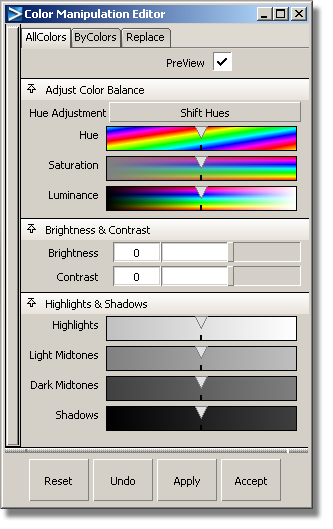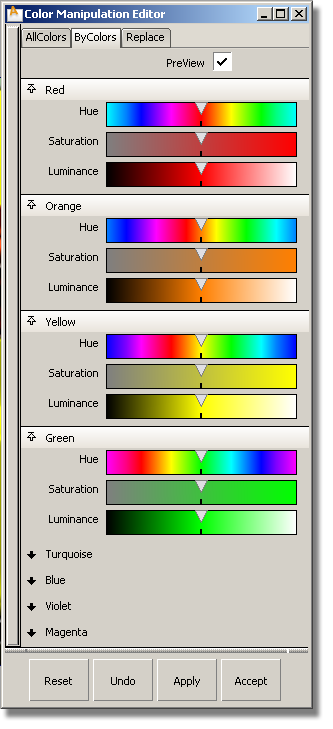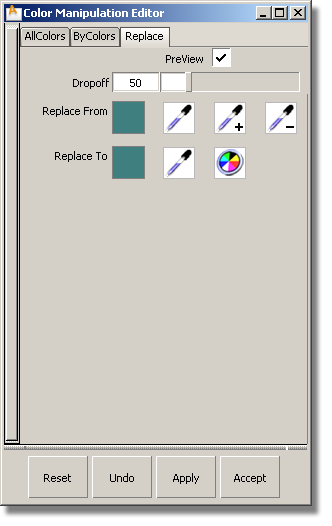Combines the functionality of several color correction tools (Color Balance, Brightness & Contrast, Saturation & Value, Color Replace) in one easy to use interface.
In addition, it lets you:
The Color Manipulation Editor has three tabs: AllColors, ByColors, and Replace.
The PreView check box, available in all three tabs, lets you compare the current state of the image with the original one, by switching between them in the modeling window.
Sliders in this tab affect the entire image (all colors). You can control the Hue, Saturation, Luminance, Brightness, and Contrast for all colors simultaneously. You can adjust the Highlights, Shadows, Light Midtones and Dark Midtones independently, to be brighter or darker.

Shift Hues – Shifts all colors by the same hue value.
Colorize Hues – Changes all colors to the selected Hue value. Gray areas (without hue) remain gray.
Colorize Hues & Grays – Changes all colors to the selected Hue value, including gray areas.
When this slider is set to 1.0, the Hue setting takes precedence over the current hue. When it is set to 0.0, the Hue setting has no effect. Intermediate values blend the Hue setting with the current colors.
When Hue Adjustment is set to Shift Hues, this slider adjusts the magnitude of the shift in hue. Otherwise, it lets you select a specific hue which is blended with the original colors according to the value of Hue Strength.
Move the slider to the right to increase the saturation, and to the left to decrease it. This change affects all colors in the image.
Move the slider to the right to increase the luminance, and to the left to decrease it. This change affects all colors in the image
This slider increases or decreases the brightness of the entire image, regardless of color.
This slider increases or decreases the contrast of the entire image, regardless of color.
Makes the highlights brighter or darker.
Makes the light midtones brighter or darker.
Makes the dark midtones brighter or darker.
Makes the shadows brighter or darker.
Sliders in this tab affect predefined portion of the image based on colors. It is useful to change one general color quickly into another.
The full-color spectrum has been divided into eight overlapping colors which can be simultaneously manipulated. The colors are overlapping so hard breaks are not created in the resulting image.
You can change the Hue, Saturation, and Luminance individually for each of the eight colors: Red, Orange, Yellow, Green, Turquoise, Blue, Violet, Magenta.

This tab lets you select the color that you want to replace (Replace From), as well as the color you want to replace it with (Replace To).
The Replace From color can be specified as a range by adding several colors using the color picker.
These controls are used to refine the modifications made using the ByColors tab.

Use this slider to increase or decrease the tolerance for the selected colors.
Select the color to replace
by clicking the color picker  , then clicking the color
you want to replace in the image. Use the
, then clicking the color
you want to replace in the image. Use the  icon to add additional colors
to the selection. Use the
icon to add additional colors
to the selection. Use the  icon to subtract colors
from the selection.
icon to subtract colors
from the selection.
Select the replacement
color by clicking the color picker  , then clicking the color
you want. Or click the color wheel icon and select the color from
the Color Editor.
, then clicking the color
you want. Or click the color wheel icon and select the color from
the Color Editor.
The four buttons at the bottom of the window behave as follows:
Undoes all the modifications since the last “Apply”.
Undoes the last modification. You can click this button multiple times to revert modifications all the way back to the beginning.
Applies successive modifications without having to exit the tool. It bakes the resulting image and resets all the sliders to their neutral position.
Clicking on another tab at the top of the window also applies the last modification.
Applies the modifications as with the Apply button, but it also exits the tool. The last brush tool used becomes the active tool.
 +Z (Windows)
or
+Z (Windows)
or  +Z (Mac).
+Z (Mac).